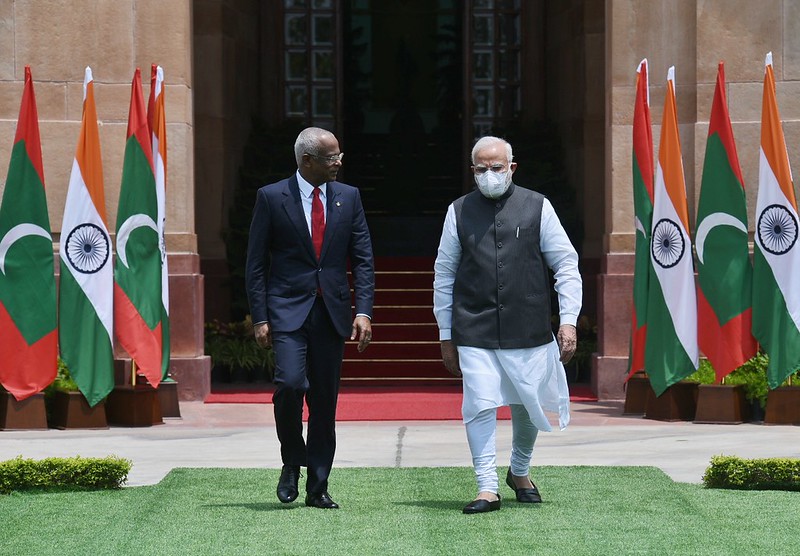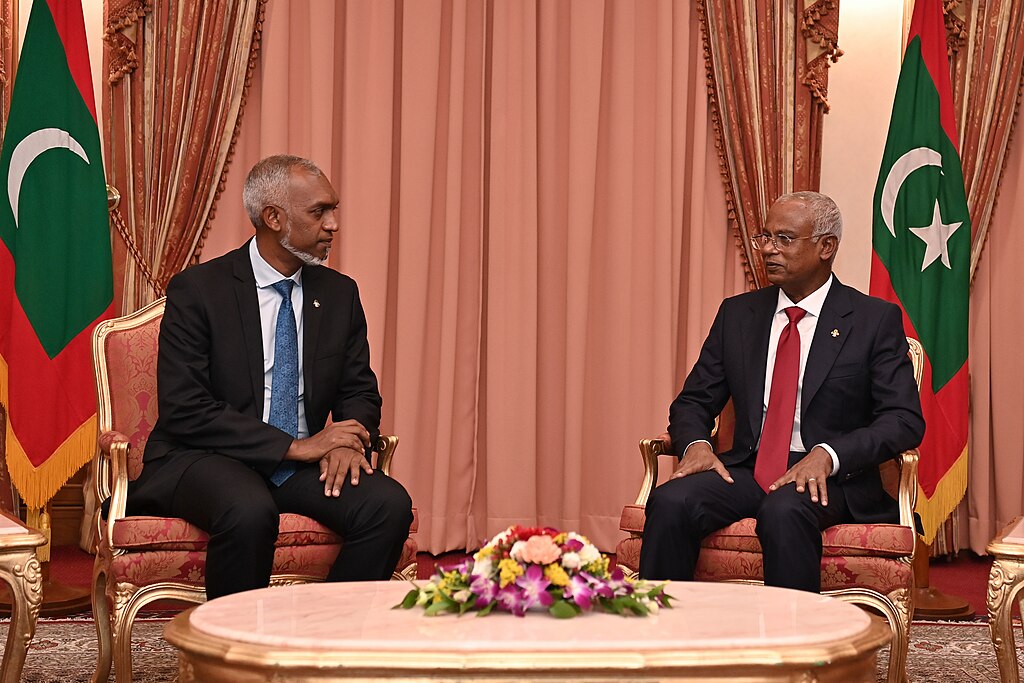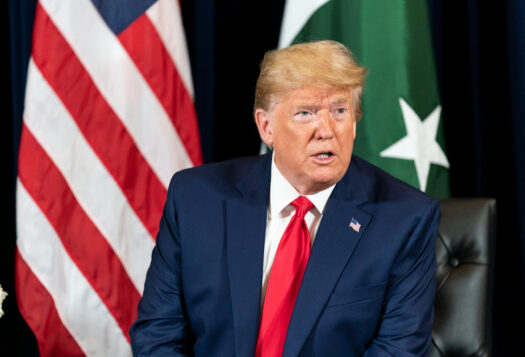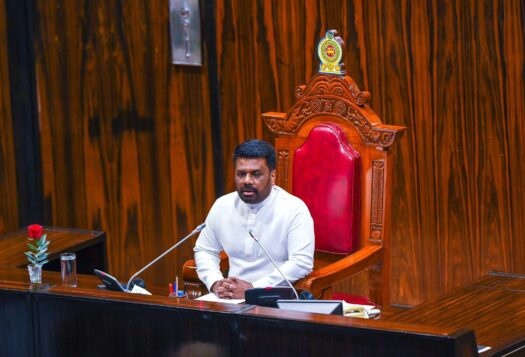
The recent political transitions in the Maldives are poised to exert significant influence on the geopolitical dynamics between India and China in the Indian Ocean. The victory of Mohamed Muizzu, a pro-China candidate, in the recent presidential election, defeating the incumbent President Ibrahim Solih, has ignited debates within India’s strategic community regarding its relationship with its longstanding partner, the Maldives. During the election, President Ibu Solih secured 45.96 percent of the votes, while his challenger, Mohamed Muizzu, emerged victorious with 54.04 percent of the votes, largely due to his anti-India stance framed under the euphemism “regaining Maldivian freedom”. His anti-India stance was fueled by the perception that a defense cooperation agreement was being misconstrued as the establishment of a permanent Indian military base.
While Muizzu has made several unsubstantiated claims of an Indian “military presence” in the Maldives, the reality is that Indian presence primarily comprises a limited number of military personnel stationed in the island state to provide training and capacity building support to the Maldivian armed forces. The provocative rhetoric of President-elect Muizzu, set to be sworn in on November 17, is a concern for India. His strategy seems to revolve around influencing public opinion and molding the discourse to align with Beijing’s interests. Against the backdrop of a shift from Solih’s “India First” policy to the Progressive Party of Maldives’ (PPM) “India out” campaign, there may be significant changes in the geopolitical dynamics of the Indian Ocean Region, of which India should be keenly aware.
(Muizzu’s) anti-India stance was fueled by the perception that a defense cooperation agreement was being misconstrued as the establishment of a permanent Indian military base.
The Maldives’ Geostrategic Importance in the Indian Ocean
The strategic location of the Maldives, positioned at the critical junction of international shipping lanes and sea lines of communication (SLOCs) through which two-thirds of the world’s oil and half its container shipments pass, makes it a critical actor in Indian Ocean geopolitics. China recognizes the strategic importance of the Maldives as a key hub in the global trade and energy flow and seeks to expand its sphere of influence in the Indian Ocean region to secure its own trade interests and energy supplies. Whereas India’s strategic interest in the Maldives is driven by its commitment to fostering a favorable and harmonious maritime environment in the Indian Ocean, which aligns with its overarching strategic priorities. India recognizes the crucial role of the Maldives as a key partner in its efforts to ensure peace, stability, and security in the Indian Ocean Region (IOR).
Maldives, a Small Island Developing State (SIDS) characterized by its remoteness, fragility, and dependence, effectively uses ‘hedging strategies’ to enhance its foreign policy and strategic choices. This approach involves strengthening ties — diplomatic, economic, and military — with several states rather than aligning with a single power. In this regard, the ‘hedging strategy’ is extensively employed by the Maldives to engage with both China and India. This strategy allows Male to engage with China and India across various dimensions, including economic cooperation, infrastructure development, and diplomatic relations, while avoiding excessive reliance on any one partner. It leverages the economic prospects and investments offered by China’s Belt and Road Initiative (BRI) as well as India’s initiatives like SAGAR (Security and Growth for All in the Region) and the Neighborhood First Policy.

Relationship between China and the Maldives
China lacks direct access to the Indian Ocean and is driven by the need to overcome the Malacca Dilemma — a hypothetical wartime scenario that assumes the potential for the U.S. or Indian navies to blockade or substantially disrupt China’s Indian Ocean sea routes beyond the Malacca Strait. Within this context, China has a multifaceted engagement in the wider IOR through infrastructure development, politico-diplomatic endeavors, and connectivity and access projects to achieve both geoeconomic and military objectives. The Maldives is pivotal to this dual objective – a vital ‘pearl’ in China’s String of Pearls strategy, aimed at consolidating its growing presence in the IOR.
Since Xi Jinping’s first visit to the Maldives in 2014, Sino-Maldivian relations have grown significantly in both stature and substance. Through its BRI, China is actively investing in large-scale infrastructure projects in the Maldives, with the most prominent ones situated on the capital island of Male and the adjacent island, Hulhumalé. During the previous pro-China government’s reign in the Maldives, Chinese companies were consistently favored over Indian firms, a trend evident in several infrastructure projects. One such project involved the expansion of the Velana International Airport in Male, where the Beijing Urban Construction Group secured a deal in 2014, displacing India’s GMR, which had previously held the contract.
Maldives’ Pro-China sentiment was further underscored by the signing of the Free Trade Agreement (FTA) between the two countries, where they committed to reducing tariffs on over 95 percent of goods to zero and cooperating in key areas, including opening up service markets such as finance, healthcare, and tourism. Despite a loss of USD $4 million in import duty revenue in 2018 due to a tariff waiver on Chinese goods, and trade figures showing a significant tilt towards Beijing’s perceived predatory practices and economic polarization, President Abdulla Yameen’s regime hailed the FTA as a game-changer. Over 70 percent of Maldives’ existing foreign debt already owed to China – where the interest on these loans alone accounts for “more than 20 percent of Maldives’ budget,” as highlighted by the former President Nasheed. This FTA is expected to further deepen Maldives’ reliance on Chinese debt, raising concerns about the erosion of the country’s sovereignty and independence.
Relationship between India and the Maldives
India and the Maldives share deep and longstanding ties rooted in ethnic, linguistic, cultural, religious, and commercial connections. India was among the first nations to recognize the Maldives after its independence in 1965 and establish diplomatic relations. The geographical proximity of the Maldives to the west coast of India, along with its pivotal location in the commercial sea lanes of the Indian Ocean, particularly the 8° N and 1 ½° N channels, underscores its significant strategic importance to India. As the major player in the region, India has much to offer the Maldives in fulfilling its development and maritime security needs through coordinated presence and patrolling of the vast exclusive economic zone (EEZ). Engagement through the “Neighborhood First” and “SAGAR” initiatives over the past years has provided substantial assistance to the Maldives to overcome its myriad challenges. This includes its military intervention in November 1988 to quell a coup attempt orchestrated by foreign mercenaries, and its substantial relief efforts following the disastrous tsunami of 2004, a water crisis in 2014, and the COVID-19 pandemic in 2020.
The incumbent government in the Maldives, under the leadership of President Ibrahim Mohamed Solih, has decisively aligned the country’s foreign policy with India, emphasizing India’s role as a source of economic benefits and security. President Solih has notably redirected the Maldives’ global affairs by publicly committing to an “India First” policy. This shift coincided with New Delhi’s engagement in various infrastructure projects, substantial assistance during the pandemic, and support for the Maldives Foreign Minister Abdulla Shahid’s campaign to be elected as President of the United Nations General Assembly. In contrast, the political opposition, led by former President Abdulla Yameen Abdul Gayoom, has called upon the president to reassess the depth of this relationship, ostensibly with the aim of safeguarding the Maldives’ sovereignty. Consequently, the outcome of the recent election between Solih and Muizzu has been characterized by many India-China commentators as a perceived “setback” for India.
This evolving landscape highlights the complex dynamics at play in the Maldives, where continuity in India-Maldives relations meets the changing dynamics of China’s expanding presence, shaping the geopolitical landscape in Indian Ocean’s strategic sphere.
What Happens Next?
President-elect Mohamed Muizzu has emerged as a significant player in Maldivian politics, and his election success hinged on a sustained campaign against India’s considerable political and economic influence in the Maldives. His election signifies the ongoing tug-of-war for influence and alliances in this strategically located island nation. Therefore, Muizzu will confront the critical challenge of striking a delicate balance between nurturing relations with New Delhi and expanding ties with Beijing. This endeavor comes with the added complexity of managing the country’s substantial debt burden. Adopting a confrontational stance against India could prove detrimental to the Maldives, given their historically close relationship. The country must navigate this complex task, aligning its traditional and strategic interests with India, its closest and most influential neighbor.
India’s approach stands in stark contrast to China’s predatory economic practices and strategic actions. India’s strategy is firmly grounded in the principle of ‘equity of development,’ promoting constructive development and mutually beneficial growth. In contrast, Beijing perceives these political developments as an opportunity to expand its sphere of influence further into India’s strategic backyard. This evolving landscape highlights the complex dynamics at play in the Maldives, where continuity in India-Maldives relations meets the changing dynamics of China’s expanding presence, shaping the geopolitical landscape in Indian Ocean’s strategic sphere.
Also Read: In the Maldives, Domestic Politics is Causing China to Lose Ground
***
Image 1: Modi with Ibrahim Solih via Flickr
Image 2: Ibrahim Solih meeting Mohamed Muizzu via Wikimedia Commons


